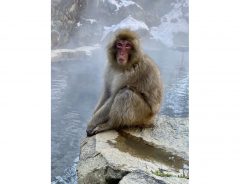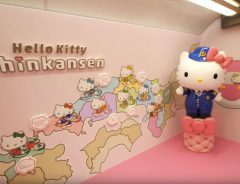
Source: © Sankei News
Wild Japanese Macaque Sighted in Downtown Osaka / Monkey Do’s and Dont’s in Japan
- Tags:
- Japanese macaque / Monkey / Osaka
Related Article
-

A trip to Snow Monkey Park in the mountains of Nagano prefecture
-

Enjoy the taste of summer at this pancake cafe’s peach fair
-

The Hello Kitty Bullet Train Fully Revealed In Japan
-

Impress A Special Someone By Fighting Mobsters And Defusing Bombs At Osaka’s Oldest Theme Park
-

When Train Cultures Collide: Tatami Kanzaki’s One-Frame Manga Depicts A Traveler’s Woes
-

Black Lives Matter March in Osaka Draws Crowd of Over 1,000


Japanese macaque sightings in Osaka
Since September 24th, several reports have been received of a wild Japanese macaque monkey sighted in downtown Osaka. At the time of writing, police have yet to capture the monkey, as sightings continue this morning. The incident has prompted authorities to issue warnings concerning appropriate behavior when encountering Japanese macaques.
According to the Nikkan Sports, around 10:10 AM on September 25th, police received a report from a man in the Shinmachi 3-chome area of Nishi Ward, Osaka City, saying "there's a monkey walking around." Since September 24th, several reports were received on sightings in Naniwa Ward and Tennoji Ward. Police is now on alert but no reports of injuries have been received thus far.
As the macaque appears to be moving between buildings and apartments, the police cautioned: "If you find the monkey, do not stare at it and calmly move away."
Monkey on the move: various reports
"A monkey showed up in Nishinari"
"There was a monkey next to the shop"
"(The monkey) was dashing at full speed across the overpass near Port1 close to National Route 43 in Bentencho (...)"
Based on above news source, social media posts and reports submitted on the Gaccom school safety information site, it would seem that the macaque is wandering around downtown Osaka tracing a loop from Sumiyoshi Ward, into central Osaka and then around to Nankonaka (at time of writing). Let's hope the monkey will find its way out of the city and back to its tribe.
Japanese macaque behavior
According to the Osaka Prefectural Government's website, Japanese macaques leave their tribes between the ages of 4 and 6 in order to find another tribe. This is a natural instinct developed in order to avoid inbreeding. However, as a result, macaques may sometimes wander into cities. Therefore, macaque sightings in cities do not occur because there isn't enough food in their natural habitat, a common misconception.
Japanese macaques are famous for hanging out in hot springs in winter and can often be found in hilly areas throughout Japan. Although encounters within the city like this one are rare, it is quite common for tourists to encounter them in rural areas, including tourist attractions, throughout Japan.
Do's and Dont's with Japanese Macaques
Whether you come across one in the wild or in the city, these are the following things to consider when encountering a Japanese macaque:
itteki | © PIXIV
Don't feed and don't show food!
Wild macaques unaccustomed to humans may scratch and bite when given food, so this is dangerous. Please only feed macaques in situations when you are specifically encouraged to do so, such as in parks and facilities with feeding areas. The other problem with feeding is that macaques who become accustomed to humans may come to depend on this and may have difficulties returning to the wild, encouraging overpopulation near human habitats, which in turn can lead to crop damage.
Don't approach!
Macaques are not your pets. If you approach them, they may possibly attack. Young children are particularly at risk.
Avoid prolonged eye contact!
Prolonged eye contact is interpreted as a threatening action by macaques, so they may attack you when you turn away from them. It's better to avoid eye contact as much as possible.
Don't tease!
If you tease a macaque, it may act unpredictably and it could escalate into a dangerous situation.
Don't raise your voice!
If you raise your voice around macaques, they may get excited, which is best to avoid.
(Source: Sagamihara City website)
If you follow these pointers, you'll be better prepared the next time you encounter a Japanese macaque on your visit to Japan.